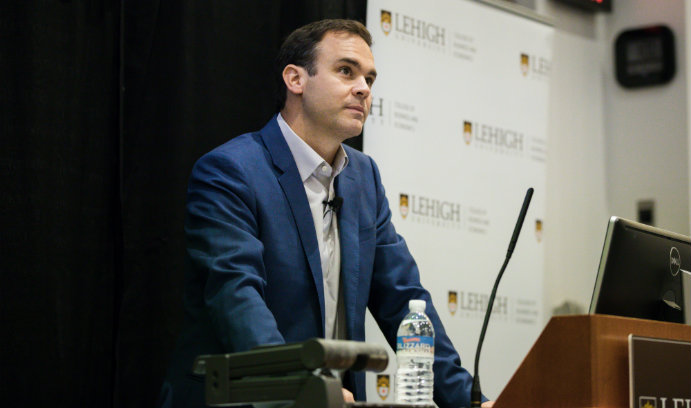Cornell Introduces Grade Non-Disclosure – New York News

Let’s explore some of the most interesting stories that have emerged from New York business schools this week.
Johnson Students Vote to Enact Grade Non-Disclosure – Johnson Business Feed
After a year-long study initiated by Johnson’s Student Council to “evaluate the alignment of academics and recruiting,” Cornell Johnson students have “voted to enact a policy of grade non-disclosure” in which Two-Year, One-Year, and Johnson Cornell Tech MBA students need not “disclose their grades to recruiters until after a full-time, post-graduation job offer has been extended.”
Associate Dean for MBA Programs Vishal Gaur writes “We hope that grade non-disclosure will encourage students to take more academic risks and think holistically about their education, personal development, leadership, and the impact they want to have in the future.”
Victoria Wilmarth (MBA ’18), who is now Brigham and Women’s Hospital’s Deland Fellow in Hospital Administration believes “the vote will strengthen the school’s collaborative community.”
“This vote helps bring Johnson’s academic experiences into alignment with the school’s values. I think this will deepen students’ commitment to collaborative learning and support academic risk taking for professional and personal development.”
You can read the entire Johnson Business Feed article here.
Five New Faculty Bring Mix of Research Insight, Corporate Experience to Business School – Stevens Institute of Technology School of Business News
For the 2018-19 school year, the Stevens Institute of Technology School of Business welcomed five new professors, all of whom are well equipped to help students “think critically about technology’s role in solving business problems.”
- Assistant Professor Apostolos Filippas: “Research interests include business analytics, natural language processing, data science, online platforms and market design.”
- Assistant Professor Pranav Garg: “Studies human capital, organizational design and learning, and strategy.”
- Associate Professor Anand Goel: Formerly a Director with Navigant Consulting whose “corporate experience is enhanced by research work that has been featured in many top journals, including the Journal of Financial Economics, Review of Financial Studies, and Journal of Finance.”
- Assistant Professor Majeed Simaan: Research interests include “banking and risk management, financial networks and interconnectedness, and portfolio theory and asset allocation.”
- Assistant Professor Jordan Suchow: Formerly a “research scientist with the Berkeley Artificial Intelligence Research Lab at the University of California–Berkeley.”
You can find out more about the new hires here.
New York Times‘ David Gelles: ‘When CEOs Speak Out, the World Listens’ – Lehigh College of Business Blog
New York Times business reporter David Gelles used his keynote speech at the recent Lehigh University College of Business and Economics 2018 Impact Symposium to posit “companies can no longer afford to sit on the sidelines when it comes to the hot button issues of the day.”
“On topics ranging from climate change to health care, gun laws to birth control, the biggest brands in the country are being forced to take a stand. It’s hard to state what an abrupt change this is,” he explains.

Gelles at the recent Lehigh University College of Business and Economics 2018 Impact Symposium / Photo via Christa Neu
He adds, “Until recently, companies avoided controversy at all costs. But these days, they are confronting it head on, sometimes even embracing it when it arrives unexpectedly, and in rare instances, seeking it out.”
Gelles points to Salesforce founder and CEO Marc Benioff’s threat to relocate its Indiana office in response to a 2015 law that would have “made it easier for religious conservatives to refuse service to gay people.”
Gelles explains, “Being a chief executive no longer means just running a profit and loss statement. It means being prepared to articulate your values—and your company’s values—when you least expect it. When CEOs speak out, the world listens. Sometimes, policies even change.”
You can read more about Gelles’ speech at Lehigh here.
Sally Blount on Solving the Female CEO Conundrum

Just one year after setting the the Fortune 500 female CEO record, numbers are already declining.
Finding Your New Career: What MBAs Need to Know About Aetna

Founded in 1853, Aetna Inc. has long been one of the most successful health care companies in the world. Serving roughly 37 million consumers, Aetna makes it a priority to recruit diverse and dedicated individuals to their team of nearly 50,000 employees throughout the U.S. The company’s wide reach and impact on the world of health care cannot be overstated; last year, the company made headlines with the huge announcement that it would be purchased by CVS in a $69 billion acquisition—a move which one New York Times report said would “reshape the American health care industry.”
With a commitment to finding skilled team members, and with needs ranging from health care to technology to financial services, it’s no wonder that Aetna and MBAs can make a perfect pair. Aetna has a long history of MBA recruitment, offering a Summer Associate Program which was recently named in Vault‘s 2018 “Top Internship Survey” as the second “Best Healthcare Internship” and ninth “Best Financial Services Internship.”
Why MBAs Love Aetna
Even with massive growth and the status of Fortune 50, Aetna can hardly be described as a stuffy or overly bureaucratic workplace. And it’s no wonder with a mission to help people and build a healthier world that that work should start with their own employees. The recognition Aetna has received for their diverse workplace speaks for itself: in 2016, the Human Rights Campaign Foundation named the company among the best places to work for LGBT employees. Other awards include a 2015 “Best Employer Healthy Lifestyles Platinum Award” form the National Business Group on Health, as well ranking in Training magazine’s “Training Top 125” as the 60th best company for employee development.
MBAs may be drawn to a potential Aetna career for its focus on employee development and creating a diverse workforce, but they probably stay for the payday. According to Payscale, MBAs at Aetna can make anywhere from $84,000 to to $10,200, a significant increase from the average salary for those with undergraduate degrees (around $70,000).

In addition, Aetna’s benefits package truly reflects the company’s strive towards healthy lifestyles. In addition to healthcare, company benefits include coverage for services like counseling, legal and financial support, employee discounts, and access to fitness centers.
Life at Aetna
Aetna offers a number of early career opportunities for recent graduates, which focus on area-specific training and providing access to a network of mentors and experienced professionals. Interested students will find development programs in a wide range of fields, including:
- Actuarial
- Finance
- General Management
- Human Resources
- Information Technology Leadership
- Information Technology Technical Training
- Sales
- Underwriting
The details of each program vary from field to field, but typically span anywhere from three to six years. Most programs also include rotations that will allow students exposure to the wide variety of opportunities open at Aetna, even within a particular area. For example, possible rotations included in the Financial Development Leadership Program include business finance, investor relations, tax, and corporate investment. After the program is completed, graduates will be placed in a full-time position, though the professional development and advancement opportunities will continue long after the program is done.
Landing an Aetna Career
Aetna is an active recruiter of MBAs and interested students should keep an eye out for professional recruiting events and career fairs throughout the country.
Each Aetna career has different requirements, but most early career programs expect applicants to have a GPA of 3.0 or higher, an undergraduate degree in a related field, strong analytical and communication skills, and the ability to succeed in a fast-paced environment.
In addition to the early career program, at the time of writing, there are 16 open jobs that require or strongly prefer applicants with MBA degrees. Below is a small sampling of the types of jobs available to MBA graduates at Aetna:
Product Strategy Manager – New Insurance Plan Design
- The Product Strategy Manager, a position for which candidates with top tier MBA degrees are preferred, will be at the forefront of decisions surrounding what healthcare is and how/where/when its delivered to those in need. According to data reported to Payscale, individuals in this role earn an average salary of $123,000 each year.
National Accounts Product & Solutions Leader
- Requiring an MBA and at least eight years of professional experience, the National Accounts Product & Solutions Director will “execute the product and solution strategy for the company in the national account employer group market” through collaboration as a member of the Large Group Solutions team.
Lead Marketing Analytics Consultant
- The Lead Marketing Analytics Consultant will use statistical predictive models to problem solve and help make decisions. The person in this role will also serve as a key contact for business stakeholders, and must be able to easily convey their predictions and recommendations to senior leadership. For this role, Aetna seeks someone with at least 7 years total business experience with an MBA preferred.
How Online MBAs Use Technology to Enable Authentic Connections

Sponsored Content
Technology has dramatically blurred the line between the digital and offline worlds; we can do almost anything online these days, ranging from ordering groceries to exploring Africa to attending college. However, one of the points of debate across nearly all fields is how the online experience compares to the parallel offline one; this has been especially true in online degree programs: Can online degrees provide the same value as their face-to-face counterparts?
The challenge of engaging and preparing students is two-fold for online degree programs. They need to cover the same key topics and transfer the same volume of knowledge as their on-ground counterparts. However, another part of the attraction of top MBA programs is that they not only develop students’ business acumen, they facilitate long-lasting connections that can lead to career opportunities and professional connections. That level of engagement presents a much bigger obstacle than catching someone’s attention long enough to complete a simple e-commerce transaction.
Technology in the Online Classroom: Two Major Lessons Learned
One of the things that makes a great online MBA successful is technology. Of course, if it were just an issue of investing in the latest and greatest tech solutions, every university would have successful digital learning programs. Further complicating things is the boom in technology built to solve this problem; which solution is best for the online classroom, and which will help build skills that will carry over into students’ careers.

After looking at some of the technology decisions at the University of Southern California’s Online MBA program, we found two major lessons for how to be successful with the kind of engagement these programs need to facilitate.
1. Innovate With Purpose
It’s easy to see the concerns over rapid technology evolution, whether you consider this 2015 New York Times article about innovation happening too quickly for businesses to keep up, or William Smith’s Morley, in which he wrote that widely available news and faster travel options would destroy relaxation as we know it, in 1886.
The technology we use will always be changing, whether it’s 1886 or 2186. One of the things that is hard to admit, though, is that the thinkers who said it would be impossible to keep up were right. Particularly at an organizational level, it really is impossible to stay current with every technology innovation that emerges.
The difference between success and failure—in the virtual classroom and in global business—is how they adapt new technologies to their environments.
One example of this in action comes from the University of Southern California’s Online MBA program. There are countless options for encouraging deeper collaboration and facilitating connections in an online setting, including a growing list of business collaboration tools as well as universities who opt to build their own social collaboration platforms. Sometimes, though, the answer is much simpler.
One of the things that stood out from USC’s Online MBA is that, in addition to the classroom sessions and videoconferencing, students chat and connect over WhatsApp. One of the biggest lessons from this experience is the fact that, sometimes, the best solution for a given problem is something students or employees are already using; it just needs to be embraced in a way that supports desired outcomes.
Why it Matters: Both businesses and universities may be reticent to allow important work and collaboration to exist outside of the platforms they control; and, there are certain instances (i.e. regulation) where allowing consumer-grade technology is a poor choice. However, embracing a student or employee-driven approach to collaboration is essential to making it work, particularly in a virtual setting. Rather than try to force students off the tool they’re comfortably using, USC can focus on smarter investments in other areas that are critical to online learning, like high quality video conferencing and learning management systems.
2. Outcomes First, Technology Second
It may seem counterintuitive at first, but the best strategies for utilizing technology don’t start by considering technology—they start by considering desired outcomes. If the goal is to facilitate the creation of real connections in a virtual space, using technology to enable this will need to feel natural and incorporate features that bring some of the same qualities of face-to-face interaction.
For online MBAs, there is a second and critical part to solving this challenge: Increasing students’ familiarity with tools that they will need to use in their professional lives.

For both businesses and higher education institutions, approaching this problem primarily from a technology perspective is the wrong approach. By thinking about desired outcomes, organizations can better guide their technology choices.
For example, with software for videoconferencing, there are myriad options. From a purely technical standpoint, many schools might first consider a solution like Blackboard Collaborate or Canvas’ built-in conference tools because so many already have Blackboard or Canvas for their Learning Management Systems.
These platforms may be enough from a functional standpoint, but, for developing true connections in an online MBA, user experience is an even more critical element of software used for video and teleconferencing. Considerations like these led USC’s Online MBA program to leverage Zoom, a dedicated communications platform, for conferencing in addition to the Canvas LMS for facilitating learning. Zoom lets students see the instructor, as well as their fellow classmates on live video, making it closer to face-to-face interaction than many alternatives. It’s also easier to schedule meetings on short notice with the ability to send calendar invites, offering similarity to the spontaneous brainstorming sessions that might happen in a classroom or office.
Why it Matters: The best solution for a given problem isn’t always the one that comes integrated with the rest of the software organizations already have. Especially for an online MBA, it’s also important to consider technology that has value beyond the classroom, as this will better equip students to succeed in their careers. The second component of this is to think about software that readily integrates with platforms people use in their daily lives anyway. Even if it is just the ability to send a meeting invite over Google Calendar, individual features can make the difference.
The Results: When Technology is Used Effectively
The biggest result of USC’s smart use of technology is that students can and do form real connections that lead to face-to-face interaction. For example, many students organize meet-ups in their area, so that those who live away from campus can still participate in the Online MBA community.
The deeper social connections, coupled with classroom learning and group discussions, also create unique opportunities that would not be as easily made without digital engagement. In USC’s case, one team of students in the recent cohort is planning to open their own business together.
The Bottom Line: Universities have historically struggled to keep pace with technology adoption. Regardless of whether a program is online, offered on-campus or uses a hybrid approach, though, the best MBA programs will stay ahead of the curve by considering outcomes first and avoiding the temptation to innovate without a clear purpose.
To learn more about the USC Marshall School of Business Online MBA, visit the Marshall website.
Here Are the Front Runners For Amazon’s New HQ2 Campus

Last week, 20 cities in the United States and Canada were informed by Amazon that their bid to host the tech giant’s second headquarters, HQ2, was still being considered. Continue reading…
Top Schools Tackle Sexual Harassment, NFL Protests, and More

Should business schools teach ethics and social responsibility? In the past, top MBA programs stuck to a fairly typical curriculum: finance, marketing, accounting, economics. And while those topics still comprise the core of most MBA programs, they’re now only a part of the whole.
Beyond allowing MBA students to focus their studies in areas like entrepreneurship or technology, MBA programs are also taking on some of the most prominent ethical topics of the day, asking students to weigh in on current headlines and happenings. It’s the MBA ethics debate.
According to a United Nations group survey of business school students from around the world, students believe that ethics are a business’s most important responsibility. According to the report, “the exposure to, and teaching of, business ethics does not merely assist business leaders to resolve moral dilemmas. More importantly, it matures their proficiency in moral judgment and their ability to incorporate social issues in the decision-making process and assists them in implementing this in an all-inclusive manner.”
For example, last year a group of business executives—including the CEO of PepsiCo and head of General Motors—got together to dissolve two business councils that consulted with President Trump after insensitive remarks about the white supremacist violence that took place in Charlottesville, VA. And other executives such as the CEO of Patagonia, Yvon Choinard, have been vocal about political and ethical issues—even using their companies to take positions on social responsibility that would typically be considered outside the scope of business.
So, it’s no wonder many business schools have been making business ethics a more important part of their curriculum. The question is, “How should business ethics be added to the MBA curriculum, and how is it being added currently?” It depends on the school.
At Georgetown University’s McDonough School of Business, Professor Edward Soule teaches courses on business ethics, corporate social responsibility, and leadership. During these classes, he told the New York Times that he has assigned coursework covering a range of trending topics including sexual harassment at Uber, social justice protests by N.F.L. players, and how companies like Amazon have responded when attacked by President Trump.
“Something has changed,” Soule said. “I would be kidding you if I told you there wasn’t a different vibe in the classroom. Ethics and values have taken on more significance. It has to do with all of the things going on in this administration, often things that challenge our understanding of ethics and leadership.”

Students discuss the recent NFL protests in Prof. Ed Soule’s class at Georgetown’s McDonough School of Business. Photo via Justin T. Gellerson for The New York Times.
Georgetown McDonough is also home to the Institute for the Study of Markets and Ethics (GISME), a center that examines the ethical issues inherent in the functioning of a market society. Students, faculty, and researchers who participate in the center explore ethical questions as they relate to business and bring ethical considerations to bear on policy decisions regarding the regulation of markets. These are especially salient issues for Georgetown McDonough given its Washington D.C. location.
“At the McDonough School of Business, we have developed a method of teaching business ethics that includes normative experiential learning, communicates in terms readily understood by business students, and involves actual ethical decision-making on the part of the students,” Michael Douma, assistant research professor and director of GISME, said in a news release. “We have found that our approach results in students being more invested in the course and more committed to resolving ethical issues that confront them in a business environment.”
Another example can be found at Carnegie Mellon’s Tepper School of Business. According to John Hooker, a professor of operations research and business ethics and social responsibility, ethics has been a part of the Tepper School curriculum since the 1990s. “Our program was apparently the first to introduce the topic (1966), as part of a course on business law,” Hooker told us. “The ethics presence has gradually increased over the years, but we ethics faculty often have to fight for it. My view is that a required ethics course should be part of the picture.”
And Leanne Meyer, co-director of the Accelerate Leadership Center at the school, told the New York Times, “There’s a turning point in what’s expected from business leaders. Up until now, business leaders were largely responsible for delivering products. Now, shareholders are looking to corporate leaders to make statements on what would traditionally have been social justice or moral issues.”
As for ethics and MBA students, Tepper’s core offering in Ethics and Leadership is one of the only second-year courses it requires its students to take. The course teaches students how to foster their ability to reason and how to handle the ethical implications of managing organizations and people.
“The basic lesson for MBA students is that business ethics is not optional,” explained Hooker. “It is the basis for the social infrastructure that makes business possible, much as engineering is the basis for physical infrastructure. It requires careful analysis and training, no less than engineering or finance. This is why we need a stand-alone ethics course. Business ethics training teaches us to do ethics with our brains rather than rely on gut feelings. Otherwise, we have no way to reach consensus on the ground rules.”
In the end, there are many options for MBA students interested in ethics, though ultimately it up to the students themselves to raise topics that are pressing to them. “Ethics courses often focus on the hot topics. This stimulates discussion and raises course ratings, but it generates more heat than light,” said Hooker. “I focus on issues that students themselves raise. I also emphasize cross-cultural ethics, because business is global, and norms vary enormously around in the world. U.S. students typically have little awareness of this.”
Whether through case studies, guest speakers, simulations, competitions, or another initiative, the leading MBA programs dive into business ethics and corporate responsibility using a range of approaches. To learn more about Professor Hooker’s approach to ethics, you can check out his blog: Ethical Decisions.
